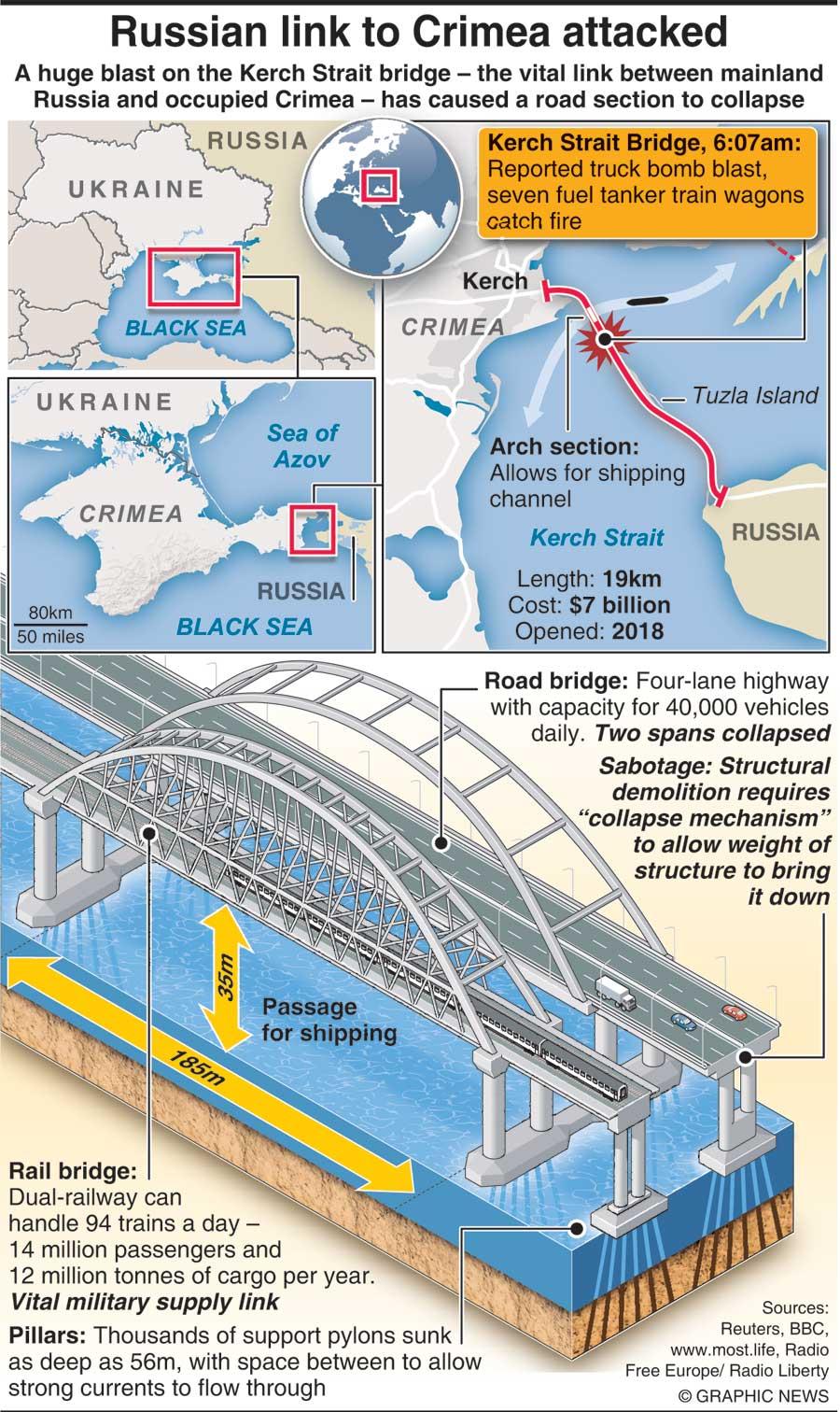14 Oct 2022 - {{hitsCtrl.values.hits}}
Saturday’s devastating blast on the bridge that connects mainland Russia with Crimea, which is now under Russia, is, no doubt, a terrorist attack. It cannot be labelled as an act of war or brought under the description that everything is fair in love and war.
brought under the description that everything is fair in love and war.
Russia’s President Vladimir Putin said it was a terrorist attack against critical civilian infrastructure, while Russia’s Federal Security Service (FSB) said the attack was organised by Ukrainian military intelligence.
According to the FSB, the 22.7-ton explosives concealed in construction polythene films originated in Ukraine and reached Russia via Bulgaria, Georgia and Armenia. In Russia, the lethal cargo was transferred to another truck. Its driver knew nothing about the deadly load or the motives of the attack’s masterminds.
The original plan was to blast the bridge on Friday, October 7 – a birthday gift to Putin. But it did not happen due to the sheer scale of the terror project. It included a plan to hack the Russia-Crimea railway system so that a fuel train could be stalled at the blast point on the road bridge. This was to cause maximum damage to the bridge known as the Kerch Strait Bridge or popularly the Crimean Bridge.
But the attackers failed in their bid to hack the railway system and decided to blow up the truck without blasting the train. About four people died and the bridge, Putin’s ambitious project which he opened in 2018, suffered extensive damage. The bridge, Russia’s only link to Crimea, was strategically important to replenish supplies to the war front. More so, if Ukraine and its 50-plus western allies launch a push to retake Crimea, which Russia annexed in 2014 following a referendum in retaliation for the West-engineered coup that saw Ukraine’s pro-Moscow president being ousted and replaced by a pro-West president.
The truck driver, a fall guy, died in the blast. There was much jubilation in Ukrainian power centres over the attack. But it ended within 24 hours when Putin like a wounded tiger pounced back. About 100 Russian missiles hit various parts of Ukraine, including Kyiv, the capital, on Monday in what was seen as a major escalation of the war. Though condemnations poured in from Ukraine’s allies over Russia’s devastating missile attacks, there was no such condemnation over the Crimea bridge attack. Instead by its silence, the West appears to have endorsed the terror attack on the bridge.
The bridge attack was the third major terror attack in recent months against Russian targets. In August, Russian political commentator cum journalist Dary Dugiana was killed in a Moscow car bomb which even the US intelligence now believes had been authorised by Ukrainian government bigwigs.
Then on September 26, the Nord Stream 1 and 2 pipelines, which carry Russian gas to Germany and other European countries were attacked. Most independent analysts believe that the underwater blasts in the Baltic Sea were carried out by Ukraine’s western allies to cause as much economic pain as possible to Russia.
In all these terror attacks against Russian targets, the western nations’ double standards on the issue of terrorism are blatantly clear.
The modus operandi in Saturday’s truck bomb that ripped apart the Crimea Bridge is elementary in theory but sophisticated in implementation. The one who transports the bomb does not know he is going to blow himself up, causing deaths and destruction. In Pakistan, for instance, poverty-stricken rural youth are paid a few hundred rupees by terror masterminds to carry parcels to be delivered to a particular address. Along the way, they are monitored, and as they pass the target, from a safe distance the tracker activates the bomb via a remote control device.
In Iraq during the American invasion, the story goes that at checkpoints, civilian vehicles and driving licences were seized. The drivers would be asked to come to a particular office the next day to collect the vehicles and the licences. When a driver arrived at this office, he would be handed over the licence and told to collect his vehicle from another place. Once the vehicle was collected, the driver would be directed along a particular road. He did not know that explosives had been concealed under his vehicle. The explosives-laden vehicle was blasted by a remote control device as usual by a tracker. Also used in such bomb-carrying operations were mentally retarded people.
Such operations are in contrast to the terror attacks linked to suicide cult ideologies exploited by groups such as Al Qaeda, ISIS, and the Liberation Tigers of Tamil Eelam (LTTE) during its war to carve out a separate state in Sri Lanka.
Terror attacks in whatever form and whether they are carried out in peacetime or during wars or by states or non-state actors should not be condoned by maintaining silence just because the target was the enemy. Justifying the Crimea bridge blast in the context of the ongoing Ukraine war will only be giving excuses to terror groups worldwide to openly declare their terror attacks as acts of war.
The international community working out a comprehensive anti-terrorism convention under the auspices of the UN reached some consensus in the late 1990s on what constitutes terrorism and who a terrorist is. After much debate and discussion, they overcame the contentious definitional problem arising from the claim that one man’s terrorist is another man’s freedom fighter.
However, it appears the very western nations which disagreed with this claim are now endorsing it. It is not only on the question of terrorism that western nations are vacillating over policy. They also adopt double standards on the question of occupation.
On Wednesday, western nations overwhelmingly voted at the UN General Assembly to condemn Russia’s annexation of parts of Ukraine, but the same nations would not condemn Israel’s annexation of the Palestinian territories, including East Jerusalem, and the Golan Heights that belongs to Syria.

10 Jan 2025 1 hours ago
10 Jan 2025 1 hours ago
10 Jan 2025 3 hours ago
10 Jan 2025 3 hours ago
10 Jan 2025 3 hours ago